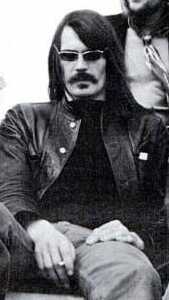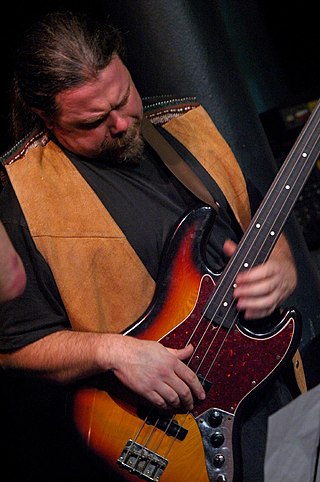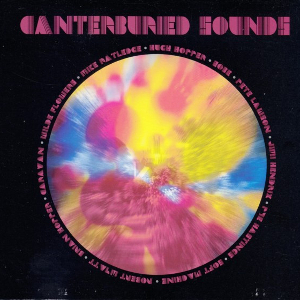The Canterbury scene was a musical scene centred on the city of Canterbury, Kent, England during the late 1960s and early 1970s. Associated with progressive rock, the term describes a loosely-defined, improvisational style that blended elements of jazz, rock, and psychedelia.

Soft Machine are an English rock and jazz band from Canterbury formed in 1966 by Mike Ratledge, Robert Wyatt, Kevin Ayers, Daevid Allen and Larry Nowlin. As a central band of the Canterbury scene, the group became one of the first British psychedelic acts and later moved into progressive and jazz rock, becoming a purely instrumental band in 1971. The band has undergone many line-up changes, with musicians such as Andy Summers, Hugh Hopper, Elton Dean, John Marshall, Karl Jenkins, Roy Babbington and Allan Holdsworth being members during the band's history. The current line-up consists of John Etheridge, Theo Travis, Fred Thelonious Baker and Asaf Sirkis.

Kevin Ayers was an English singer-songwriter who was active in the English psychedelic music movement. Ayers was a founding member of the psychedelic band Soft Machine in the mid-1960s, and was closely associated with the Canterbury scene. He recorded a series of albums as a solo artist and over the years worked with Brian Eno, Syd Barrett, Bridget St John, John Cale, Elton John, Robert Wyatt, Andy Summers, Mike Oldfield, Nico and Ollie Halsall, among others. After living for many years in Deià, Mallorca, he returned to the United Kingdom in the mid-1990s before moving to the south of France. His last album, The Unfairground, was released in 2007. The British rock journalist Nick Kent wrote: "Kevin Ayers and Syd Barrett were the two most important people in British pop music. Everything that came after came from them."

Hugh Colin Hopper was a British progressive rock and jazz fusion bass guitarist. He was a prominent member of the Canterbury scene, as a member of Soft Machine and other bands.

Third is a live and studio album by the English rock band Soft Machine, released as their third overall in June 1970 by CBS Records. It is a double album with a single composition on each of the four sides, and was the first of two albums recorded with a four-piece line-up of keyboardist Mike Ratledge, drummer and vocalist Robert Wyatt, saxophonist Elton Dean, and bass guitarist Hugh Hopper. Third marks a shift in the group's sound from their psychedelic origins towards jazz rock and electronic music.

Elton Dean was an English jazz musician who performed on alto saxophone, saxello and occasionally keyboards. Part of the Canterbury scene, he featured in Soft Machine, among others.

Volume Two is the second album by The Soft Machine, released in 1969. The album combined humour, dada, psychedelia and jazz. In 2000 it was voted number 715 in Colin Larkin's All Time Top 1000 Albums.
Phillip "Pip" Pyle was an English-born drummer from Sawbridgeworth, Hertfordshire, who later resided in France. He is best known for his work in the Canterbury scene bands Gong, Hatfield and the North and National Health.

The Wilde Flowers were an English psychedelic rock band from Canterbury, Kent. Formed in 1964, the group originally featured lead vocalist Kevin Ayers, lead guitarist and co-lead vocalist Brian Hopper, rhythm guitarist and vocalist Richard Sinclair, bassist Hugh Hopper and drummer Robert Wyatt. Despite not releasing any material during their brief three-year tenure, the band are generally considered to be the originators of the Canterbury scene. After their breakup in 1969, the group's members went on to form numerous key bands within the scene, including Soft Machine, Caravan and Camel.

Short Wave Live is the only album by Short Wave, a UK band related to the Canterbury Scene, consisting of Hugh Hopper (bass), Didier Malherbe (sax), Phil Miller (guitar) and Pip Pyle (drums).

Richard Stephen Sinclair is an English progressive rock bassist, guitarist, and vocalist who has been a member of several bands of the Canterbury scene.

Michael Roland Ratledge is a British musician. A part of the Canterbury scene, he was a founding member of Soft Machine. He was the last founding member to leave the group, doing so in 1976.

Roy Babbington is an English rock and jazz bassist. He became well known for being a member of the Canterbury scene progressive rock band Soft Machine.
Soft Heap was a Canterbury scene and jazz-rock supergroup founded in January 1978 and active throughout the Eighties.

Mark Hewins is an English guitarist known for his connections to the Canterbury scene, a group of English progressive rock musicians during the 1960s.

John Michael Glyn Etheridge is an English jazz fusion guitarist, composer, bandleader and educator known for his eclecticism and broad range of associations in jazz, classical, and contemporary music. He is best known for his work with Soft Machine from 1975 to 1978, 1984 and 2004 to present.

Fred Thelonious Baker is an English guitarist and jazz bass guitarist from Tibshelf, Derbyshire. He is known for playing in Phil Miller's Canterbury scene band In Cahoots.

Canterburied Sounds is a series of four CDs of archival Canterbury scene recordings compiled from the private collection of Brian Hopper. The set includes some of the earliest-known recordings of Caravan, Soft Machine, Robert Wyatt, and Wilde Flowers.

Patrice Meyer is a French electric guitarist active in Jazz, Jazz rock, Progressive rock and Canterbury scene bands.
















